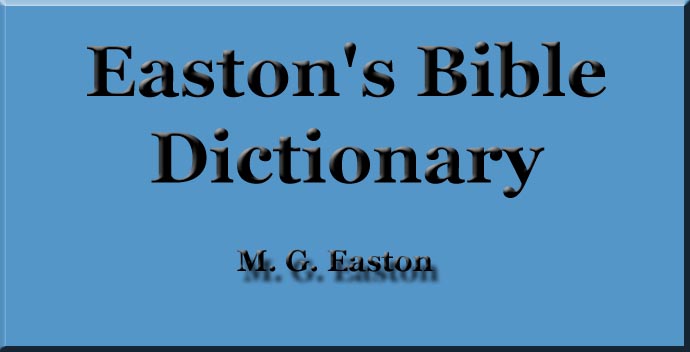

Mezahab Water of gold, the father of Matred (Gen 36:39; Ch1 1:50), and grandfather of Mehetabel, wife of Hadar, the last king of Edom.
Miamin =Mijamin, from the right hand. (1.) The head of one of the divisions of the priests (Ch1 24:9). (2.) A chief priest who returned from Babylon with Zerubbabel (Neh 12:5), called Mijamin (Neh 10:7) and Miniamin (Neh 12:17).
Mibhar Choice, a Hagarene, one of David's warriors (Ch1 11:38); called also Bani the Gadite (Sa2 23:36).
Mibsam Fragrance. (1.) One of Ishmael's twelve sons, and head of an Arab tribe (Gen 25:13). (2.) A son of Simeon (Ch1 4:25).
Mibzar Fortress, one of the Edomitish "dukes" descended from Esau (Gen 36:42; Ch1 1:53).
Micah A shortened form of Micaiah, who is like Jehovah? (1.) A man of Mount Ephraim, whose history so far is introduced in Jdg 17:1, apparently for the purpose of leading to an account of the settlement of the tribe of Dan in Northern Palestine, and for the purpose also of illustrating the lawlessness of the times in which he lived (Judg. 18; 19:1-29; Jdg 21:25). (2.) The son of Merib-baal (Mephibosheth), Ch1 8:34, Ch1 8:35. (3.) The first in rank of the priests of the family of Kohathites (Ch1 23:20). (4.) A descendant of Joel the Reubenite (Ch1 5:5). (5.) "The Morasthite," so called to distinguish him from Micaiah, the son of Imlah (Kg1 22:8). He was a prophet of Judah, a contemporary of Isaiah (Mic 1:1), a native of Moresheth of Gath (Mic 1:14, Mic 1:15). Very little is known of the circumstances of his life (Compare Jer 26:18, Jer 26:19).
Micah, Book of The sixth in order of the so-called minor prophets. The superscription to this book states that the prophet exercised his office in the reigns of Jotham, Ahaz, and Hezekiah. If we reckon from the beginning of Jotham's reign to the end of Hezekiah's (759-698 B.C.), then he ministered for about fifty-nine years; but if we reckon from the death of Jotham to the accession of Hezekiah (743-726 B.C.), his ministry lasted only sixteen years. It has been noticed as remarkable that this book commences with the last words of another prophet, "Micaiah the son of Imlah" (Kg1 22:28): "Hearken, O people, every one of you." The book consists of three sections, each commencing with a rebuke, "Hear ye," etc., and closing with a promise, (1.) Micah 1; Mic 2:1; (2.) Micah 3 - 5, especially addressed to the princes and heads of the people; (3.) Micah 6 - 7, in which Jehovah is represented as o the holding a controversy with his people: the whole concluding with a song of triumph at the great deliverance which the Lord will achieve for his people. The closing verse is quoted in the song of Zacharias (Luk 1:72, Luk 1:73). The prediction regarding the place "where Christ should be born," one of the most remarkable Messianic prophecies (Mic 5:2), is quoted in Mat 2:6. There are the following references to this book in the New Testament: Mic 5:2 (compare Mat 2:6; Joh 7:42), Mic 7:6 (compare Mat 10:21, Mat 10:35, Mat 10:36), Mic 7:20 (compare Luk 1:72, Luk 1:73).
Micaiah Who is like Jehovah?, the son of Imlah, a faithful prophet of Samaria (1 Kings 22:8-28). Three years after the great battle with Ben-hadad (Kg1 20:29), Ahab proposed to Jehoshaphat, king of Judah, that they should go up against Ramoth-Gilead to do battle again with Ben-hadad. Jehoshaphat agreed, but suggested that inquiry should be first made "at the word of Jehovah." Ahab's prophets approved of the expedition; but Jehoshaphat, still dissatisfied, asked if there was no other prophet besides the four hundred that had appeared, and was informed of this Micaiah. He was sent for from prison, where he had been confined, probably on account of some prediction disagreeable to Ahab; and he condemned the expedition, and prophesied that it would end, as it did, in disaster. We hear nothing further of this prophet. Some have supposed that he was the unnamed prophet referred to in Kg1 20:35.
Micha (1.) Sa2 9:12 = MICAH (2). (2.) The son of Zabdi, a Levite of the family of Asaph (Neh 11:17, Neh 11:22).
Michael Who is like God? (1.) The title given to one of the chief angels (Dan 10:13, Dan 10:21; Dan 12:1). He had special charge of Israel as a nation. He disputed with Satan (Jde 1:9) about the body of Moses. He is also represented as warning against "that old serpent, called the Devil, and Satan, which deceiveth the whole world" (Rev 12:7). (2.) The father of Sethur, the spy selected to represent Asher (Num 13:13). (3.) Ch1 7:3, a chief of the tribe of Issachar. (4.) Ch1 8:16, a Benjamite. (5.) A chief Gadite in Bashan (Ch1 5:13). (6.) A Manassite, "a captain of thousands" who joined David at Ziklag (Ch1 12:20). (7.) A Gershonite Levite (Ch1 6:40). (8.) The father of Omri (Ch1 27:18). (9.) One of the sons of king Jehoshaphat (Ch2 21:2, Ch2 21:4). He was murdered by his brother Jehoram.